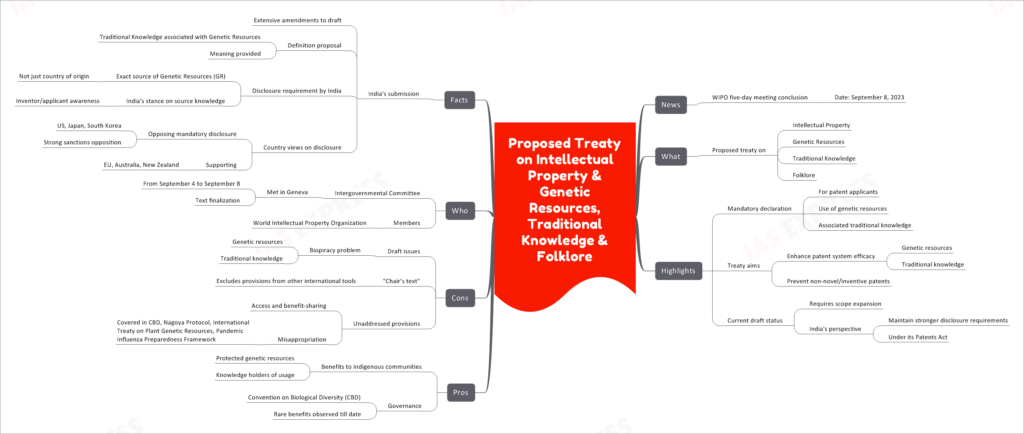Proposed Treaty on Intellectual Property and Genetic Resources, Traditional Knowledge and Folklore

- WIPO Five-Day Meeting Conclusion
- Date: September 8, 2023
What is the Proposed Treaty?
The proposed treaty addresses critical issues related to Intellectual Property (IP), Genetic Resources (GR), Traditional Knowledge (TK), and Folklore.
Highlights
Mandatory Declaration
- For Patent Applicants: The treaty mandates patent applicants to declare the use of genetic resources and associated traditional knowledge.
Treaty Aims
- Enhance Patent System Efficacy: By regulating genetic resources and traditional knowledge, the treaty seeks to improve the efficacy of the patent system.
- Prevent Non-Novel/Inventive Patents: It aims to prevent the granting of patents for inventions that lack novelty or inventiveness.
Current Draft Status
- Scope Expansion Required: The current draft necessitates expansion to address various aspects.
- India’s Perspective: India advocates for maintaining stronger disclosure requirements under its Patents Act.
Pros
Benefits to Indigenous Communities
- Protected Genetic Resources: Indigenous communities will benefit from the protection of their genetic resources.
- Knowledge Holders of Usage: Traditional knowledge holders will gain recognition and protection for their contributions.
Governance
- Convention on Biological Diversity (CBD): The treaty aligns with CBD objectives.
- Rare Benefits Observed Till Date: It builds upon the rare benefits observed through previous agreements.
Cons
Draft Issues
- Biopiracy Problem: The draft needs to address the issue of biopiracy concerning genetic resources and traditional knowledge.
“Chair’s Text”
- Excludes Provisions from Other International Tools: Some provisions from other international agreements are excluded from the “Chair’s Text.”
Unaddressed Provisions
- Access and Benefit-Sharing: Certain provisions related to access and benefit-sharing are not adequately addressed.
- Misappropriation: Issues of misappropriation are covered in various agreements such as CBD, Nagoya Protocol, International Treaty on Plant Genetic Resources, and the Pandemic Influenza Preparedness Framework.
Who is Involved?
Intergovernmental Committee
- Met in Geneva: The committee convened in Geneva from September 4 to September 8 for text finalization.
Members
- World Intellectual Property Organization (WIPO): WIPO plays a central role in shaping the treaty.
Facts
- India’s Submission: India has submitted extensive amendments to the draft, proposing a clear definition of “Traditional Knowledge associated with Genetic Resources” and emphasizing the need for disclosure regarding the exact source of genetic resources (GR) beyond just the country of origin.
- India’s Stance on Source Knowledge: India advocates for inventor/applicant awareness of the source knowledge.
- Country Views on Disclosure:
- Opposing Mandatory Disclosure: Countries such as the United States, Japan, and South Korea oppose mandatory disclosure and strongly oppose sanctions.
- Supporting Mandatory Disclosure: The European Union, Australia, and New Zealand support mandatory disclosure requirements.
The proposed treaty represents a significant step in addressing the complex issues surrounding intellectual property, genetic resources, traditional knowledge, and folklore. It strives to strike a balance between protecting indigenous communities and fostering innovation while still facing challenges related to biopiracy and international alignment. The ongoing discussions and negotiations will determine the final shape of this important international agreement.
If you like this post, please share your feedback in the comments section below so that we will upload more posts like this.

